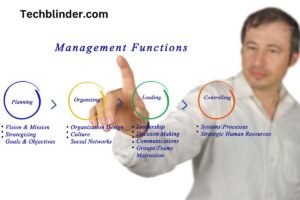Information and Communication Technology Management Function
In today’s digital age, effective Information and Communication Technology (ICT) management is imperative for businesses to thrive. From small startups to multinational corporations, the efficient handling of ICT resources can significantly impact productivity, innovation, and overall success. In this article, we’ll delve into the crucial role of ICT management function, its key components, challenges, best practices, future trends, and real-world case studies.

Introduction to Information and Communication Technology (ICT) Management
Defining ICT Management
ICT management refers to the strategic planning, implementation, and maintenance of technology infrastructure and resources within an organization. It encompasses a wide range of activities aimed at leveraging technology to achieve business objectives and improve operational efficiency.
Importance of ICT Management in Organizations
In today’s highly competitive business landscape, effective ICT management enables organizations to stay agile, innovate rapidly, and respond to market changes efficiently. It empowers businesses to optimize their processes, enhance collaboration, and deliver value to customers.
Role of ICT Management Function
Planning and Strategy Development
One of the primary functions of ICT management is to formulate comprehensive strategies aligned with organizational goals. This involves assessing current technology needs, forecasting future requirements, and developing roadmaps for technology adoption and implementation.
Implementation and Integration
Once strategies are formulated, ICT managers oversee the implementation of various technology solutions, ensuring seamless integration with existing systems and processes. This involves deploying hardware, software, and networking infrastructure while minimizing disruptions to business operations.
Maintenance and Support
Beyond implementation, ICT management encompasses ongoing maintenance and support activities to ensure the reliability, security, and performance of IT systems. This includes troubleshooting technical issues, applying software patches, and upgrading hardware components as needed.
Key Components of ICT Management

Infrastructure Management
Infrastructure management involves overseeing the physical and virtual components of an organization’s IT infrastructure, including servers, networks, and storage systems. ICT managers are responsible for designing, deploying, and maintaining robust and scalable infrastructure to support business operations.
Data and Security Management
Data is a valuable asset for organizations, and effective management of data is essential to ensure confidentiality, integrity, and availability. ICT managers implement robust data management strategies, including backup and recovery procedures, data encryption, and access control mechanisms to safeguard sensitive information.
Application Management
Applications play a critical role in facilitating business processes and delivering value to customers. ICT managers oversee the selection, deployment, and maintenance of software applications, ensuring they meet business requirements and adhere to industry standards.
Challenges in ICT Management
Rapid Technological Changes
The rapid pace of technological innovation presents a significant challenge for ICT managers, who must stay abreast of emerging trends and technologies to remain competitive. Keeping pace with technological changes requires continuous learning and adaptation.
Security Threats
With the increasing digitization of business processes, cybersecurity threats have become more sophisticated and prevalent. ICT managers face the daunting task of safeguarding organizational assets against various cyber threats, including malware, phishing attacks, and data breaches.
Budget Constraints
Limited budgetary resources pose a significant challenge for ICT managers tasked with delivering technological solutions that align with organizational goals. Balancing the need for innovation with budget constraints requires careful prioritization and resource allocation.

Best Practices in ICT Management
Regular Training and Skill Development
Investing in employee training and skill development is crucial for building a competent ICT workforce capable of addressing evolving technology challenges. Continuous learning programs help employees stay updated on the latest technological trends and best practices.
Proactive Monitoring and Risk Management
Proactive monitoring of IT systems enables ICT managers to detect and mitigate potential issues before they escalate into major problems. Implementing robust risk management processes allows organizations to identify vulnerabilities and implement appropriate safeguards.
Collaboration and Communication
Effective collaboration and communication are essential for successful ICT management. ICT managers must foster cross-functional collaboration between IT teams and other business units to ensure alignment with organizational objectives and promote innovation.
Future Trends in ICT Management
Artificial Intelligence and Automation
The integration of artificial intelligence (AI) and automation technologies is poised to revolutionize ICT management. AI-powered solutions can streamline routine tasks, improve decision-making processes, and enhance operational efficiency.
Cloud Computing
Cloud computing continues to gain traction as organizations increasingly adopt cloud-based solutions for storing data, running applications, and accessing computing resources. Cloud-based ICT management platforms offer scalability, flexibility, and cost-effectiveness.
Internet of Things (IoT)
The proliferation of IoT devices presents new opportunities and challenges for ICT managers. IoT technologies enable organizations to collect vast amounts of data from interconnected devices, offering insights that can drive business innovation and efficiency.
Case Studies in Effective ICT Management
Company A: Streamlining Operations through ICT Management
Company A implemented a comprehensive ICT management strategy aimed at streamlining operations and enhancing productivity. By leveraging cloud computing and automation technologies, they were able to optimize workflows, reduce costs, and improve scalability.
Company B: Enhancing Customer Experience with ICT Solutions
Company B prioritized customer experience by implementing ICT solutions designed to improve service delivery and satisfaction. Through the integration of customer relationship management (CRM) systems and data analytics tools, they gained valuable insights into customer preferences and behavior, enabling personalized interactions and targeted marketing campaigns.
Conclusion
In conclusion, effective Information and Communication Technology (ICT) management is essential for organizations seeking to thrive in today’s digital economy. By strategically planning, implementing, and maintaining technology solutions, businesses can optimize their operations, mitigate risks, and drive innovation. Embracing best practices, staying abreast of emerging trends, and learning from real-world case studies are key to success in ICT management.
FAQs (Frequently Asked Questions)
- What is the role of ICT management in organizational success?
- ICT management plays a crucial role in enabling organizations to leverage technology effectively, streamline operations, and achieve strategic objectives.
- How do ICT managers address security threats in today’s digital landscape?
- ICT managers employ a combination of technological solutions, employee training, and robust risk management processes to mitigate security threats and safeguard organizational assets.
- What are some emerging trends in ICT management?
- Emerging trends in ICT management include the integration of artificial intelligence, cloud computing adoption, and the proliferation of IoT devices.
- How can organizations benefit from cloud computing in ICT management?
- Cloud computing offers organizations scalability, flexibility
- Cloud computing offers organizations scalability, flexibility
